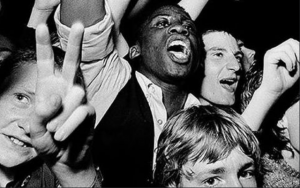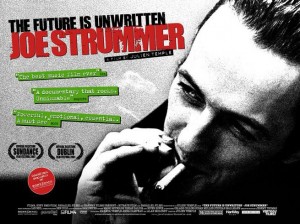WHITE RIOT: 4 STARS. “details a time more than forty years ago but doesn’t feel dated.”
 The cultural, moral and emotional impact that music has is undeniable. Songs like “Times They Are A-Changin’,” “Them Belly Full (But We Hungry),” and “What’s Going On” or events like Live Aid or The Concert for Bangladesh brought with them societal change by mobilizing music fans to action. “White Riot,” new documentary from director Rubika Shah streaming on Virtual Cinema Screening sites (see below), details the fight between Rock Against Racism and Britain’s National Front.
The cultural, moral and emotional impact that music has is undeniable. Songs like “Times They Are A-Changin’,” “Them Belly Full (But We Hungry),” and “What’s Going On” or events like Live Aid or The Concert for Bangladesh brought with them societal change by mobilizing music fans to action. “White Riot,” new documentary from director Rubika Shah streaming on Virtual Cinema Screening sites (see below), details the fight between Rock Against Racism and Britain’s National Front.
In the macro the film’s story is set against the rise of xenophobic politician Enoch Powell and violent, far-right hate group the National Front. Language that would get anyone kicked off Twitter or cancelled today was casually tossed around in the papers and on television. In one inspired sequence Shah pieces together a montage of outrageous racist remarks pulled from mainstream sitcoms. In August 1976 guitarist Eric Clapton, whose entire career was based on the elements of blues created by Black American musicians, added his voice to the rhetoric, endorsing Powell from a stage in a drunken rant. “I think Enoch’s right,” he said. “I think we should send them all back. Stop Britain from becoming a Black colony. Get the foreigners out.”
His comments caught the attention of music photographer Red Saunders who wrote a letter to the music press, calling for rock to be a force against racism. Bigtime outlets like NME, Melody Maker and Sounds all published the letter. The resulting and overwhelming response from like-minded Brits inspired Saunders to create the grassroots movement, Rock Against Racism (RAR) and a fanzine, Temporary Hoarding geared toward reporting on the stories the mainstream press ignored. “Our job,” Saunders says, “was to peel away the Union Jack to reveal the swastika.” Their reports on immigration and the police’s racist “suspected persons” powers among other hot button topics appealed to a generation of young people who embraced new ideas politically and musically, in the form of rebel music, punk rock and reggae.
Despite violent resistance from the National Front RAR persevered and “White Riot” ends, not at the end of Rock Against Racism’s mandate—they remained a potent force until 1982—but with their first massive public outing, 1978’s Carnival Against the Nazis. Headlined by The Clash, Steel Pulse and Tom Robinson, it attracted 100,000 people who began marching a march at Trafalgar Square, before the concert at Victoria Park.
“White Riot” pieces together archival footage, like unsettling shots of National Front supporters parading through London, recent interviews with the main RAR players and piles of ephemera, like old gig posters, punk badges and photos, to define the film’s time and place. Shah weaves the elements together, punctuating the info with sonic blasts of music courtesy of live footage of The Clash, The Selecter, Sham 69, Steel Pulse and others.
It is compelling stuff and even though it details a time more than forty years ago it doesn’t feel dated. Racism and rise of neo-fascism are still with us but “White Riot” reminds the viewer that resistance not only comes in many forms but that fighting the good fight is never out of date.
“White Riot” is a Virtual Cinema presentation benefitting independent movie theatres. Check out the websites for the theatres listed below, buy a ticket for $9.99 (CND), and enjoy the show while supporting a worthwhile case.
Cinematheque, The (Vancouver, BC) 09-Jul-2020 30-Jul-2020
Countryfest Community Cinema (Dauphin, MB) 09-Jul-2020 30-Jul-2020
Ted Rogers Hot Docs Cinema (Toronto, ON) 09-Jul-2020 30-Jul-2020
Winnipeg Cinematheque (Winnipeg, MB) 09-Jul-2020 30-Jul-2020
Cinema du Parc (Montreal, QC) In Cinema Screening 10-Jul-2020 16-Jul-2020


